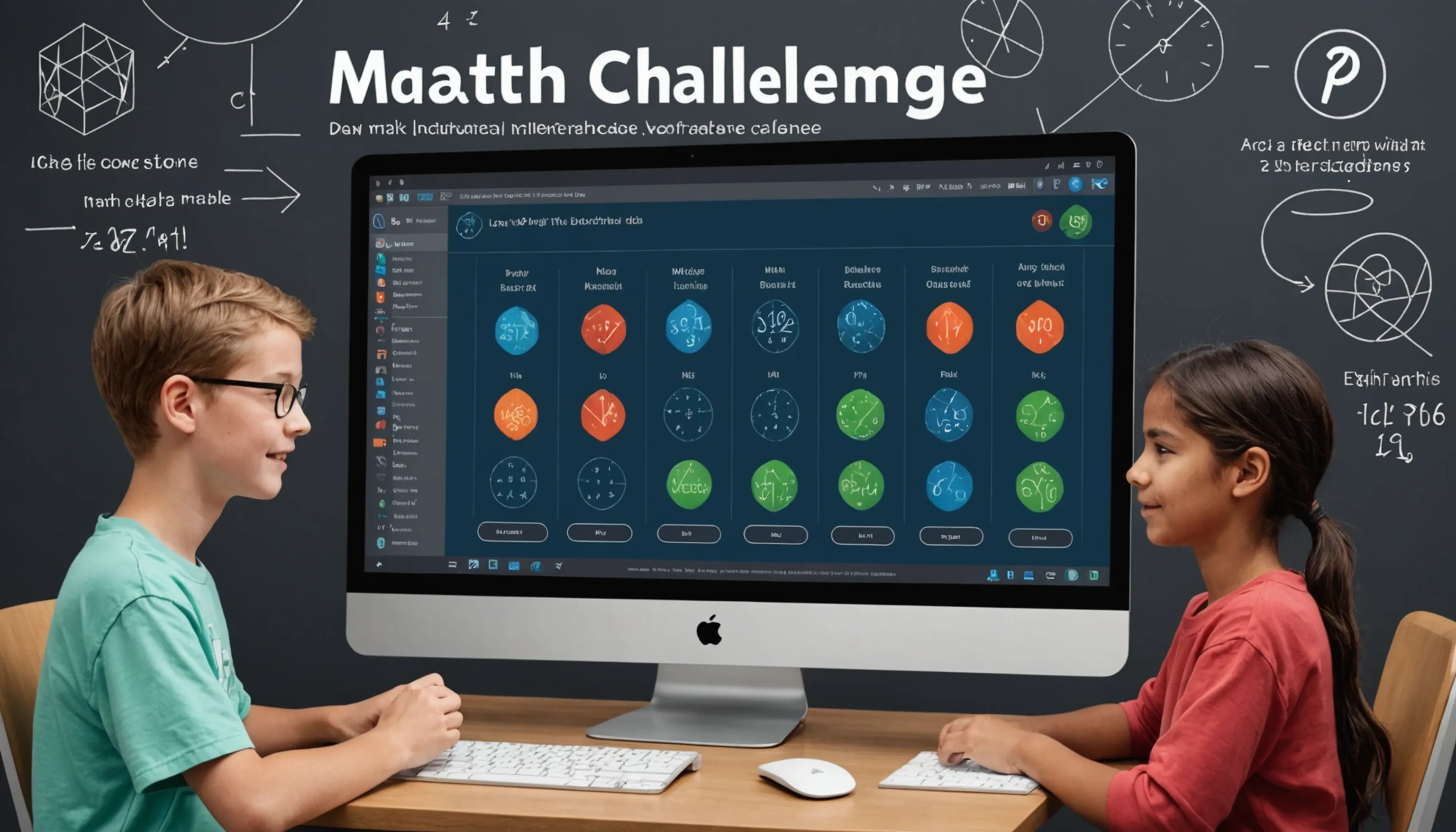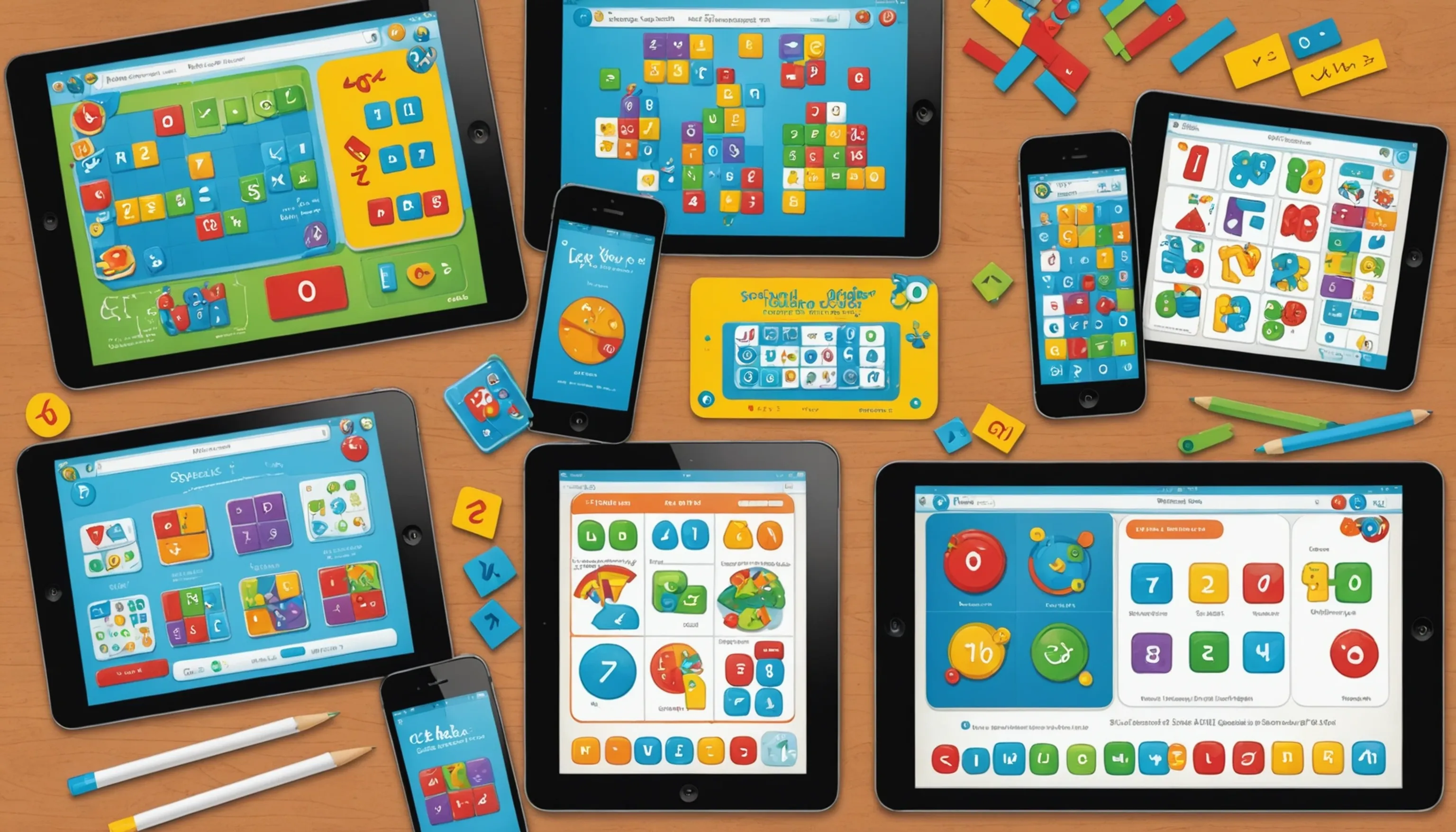Interactive Math Learning Games Free
 HvWHenry van Wagenberg
HvWHenry van Wagenberg
Top Free Interactive Math Learning Games
When it comes to enhancing math skills, interactive math learning games can be a fun and engaging solution. Here are some of the top free games available:
- Khan Academy: Offers a wide range of math exercises and video tutorials.
- Prodigy Math: Combines RPG elements with math challenges to keep teens engaged.
- Math Playground: Features various math games and puzzles that challenge critical thinking.
- IXL: Provides personalized learning experiences, though some features may require a subscription.
These games not only make learning enjoyable but also help reinforce essential math concepts.
Benefits of Interactive Math Games for Teenagers
Interactive math games offer numerous benefits for teenagers, transforming the way they engage with mathematics. One significant advantage is the increased motivation to learn. When math is presented in a game format, it becomes more enjoyable and less intimidating for teens, encouraging them to practice more frequently.
Another benefit is the development of critical thinking and problem-solving skills. Many interactive games require players to think strategically and apply mathematical concepts to advance through levels or solve challenges. This fosters a deeper understanding of math while enhancing cognitive abilities.
Additionally, these games often provide immediate feedback. This instant response helps teenagers recognize their mistakes and understand the correct solutions, facilitating a more effective learning experience. Moreover, many interactive math games adapt to the player's skill level, allowing for personalized learning pathways that cater to individual needs.
Social interaction is another key benefit. Many online math games allow teens to compete or collaborate with peers, promoting teamwork and communication skills. This social aspect can help reduce the isolation often felt in traditional learning environments, making math a more collective and enjoyable experience.
Ultimately, incorporating interactive math games into a teenager's learning routine can boost their confidence in mathematics, improve their academic performance, and prepare them for future challenges in more advanced math topics.
How to Choose the Right Math Game
Choosing the right math game for teenagers can significantly enhance their learning experience. Here are some key factors to consider:
- Age Appropriateness: Ensure the game is suitable for the teenager's age and skill level. Look for games that challenge them without causing frustration. A game that's too easy won't engage them, while one that's too difficult may discourage them.
- Learning Objectives: Identify the specific math skills you want the game to target. Whether it’s algebra, geometry, or basic arithmetic, select a game that focuses on those areas. This will ensure the game aligns with their educational needs.
- Engagement Level: Look for games that are visually appealing and interactive. Games with vibrant graphics, interesting storylines, or competitive elements can keep teenagers motivated and engaged.
- Feedback Mechanism: Choose games that provide immediate feedback. This helps teenagers learn from their mistakes and understand the correct solutions, fostering a better learning environment.
- Reviews and Recommendations: Research reviews from other parents or educators. Recommendations can guide you toward high-quality games that have proven effective for other teenagers.
By considering these factors, you can select a math game that not only enhances your teenager's skills but also makes learning math an enjoyable experience.

List of Popular Free Interactive Math Games
Here’s a list of popular free interactive math games that can help teenagers improve their math skills:
- Khan Academy: Offers extensive math practice and instructional videos.
- Prodigy Math: An engaging RPG-style game focused on math challenges.
- Math Playground: Features a variety of math puzzles and games.
- Coolmath Games: Provides fun and educational math games for all ages.
- IXL: Although primarily a subscription service, it offers free practice questions.
These games combine fun with learning, making math enjoyable for teens.
Khan Academy: A Comprehensive Math Resource
Khan Academy is a widely recognized educational platform that provides a comprehensive resource for math learning. It offers an extensive range of math topics, from basic arithmetic to advanced calculus, making it suitable for teenagers at various skill levels.
One of the standout features of Khan Academy is its structured learning path. Students can progress through different levels and topics at their own pace, which is particularly beneficial for those who may need extra time to grasp certain concepts. Each lesson includes instructional videos that explain mathematical principles in a clear and engaging manner, complemented by practice exercises to reinforce learning.
Additionally, Khan Academy provides personalized dashboards that allow teenagers to track their progress. This feature enables them to see what topics they have mastered and what areas may need more attention. Immediate feedback on exercises helps students learn from their mistakes, further enhancing their understanding of math.
Another advantage of Khan Academy is its accessibility. The platform is completely free and available on various devices, including computers, tablets, and smartphones. This makes it easy for teenagers to access high-quality educational resources anytime, anywhere.
In summary, Khan Academy serves as a powerful tool for math learning, offering a variety of resources that cater to different learning styles. Whether students need help with homework or are looking to advance their skills, Khan Academy is an invaluable resource for mastering math.
Prodigy Math: Engaging RPG Math Game
Prodigy Math is a unique and engaging role-playing game (RPG) designed to make math learning fun for teenagers. This interactive game combines the excitement of gaming with essential math skills, making it an excellent tool for reinforcing mathematical concepts in an enjoyable way.
In Prodigy Math, players embark on an adventure where they create their own characters and explore a fantasy world. Throughout their journey, they encounter various math challenges that align with the curriculum. These challenges cover a wide range of topics, including arithmetic, geometry, and algebra, ensuring that players are constantly building their math skills.
One of the key features of Prodigy Math is its adaptive learning technology. The game assesses each player's skill level and tailors the math problems to match their abilities. This personalized approach helps keep teenagers engaged while providing appropriate challenges that promote learning at their own pace.
Additionally, Prodigy Math encourages friendly competition, allowing players to battle against others or collaborate with friends to overcome challenges. This social aspect can motivate teenagers to practice their math skills regularly while having fun.
Parents and educators can also benefit from Prodigy Math, as it offers tracking tools to monitor progress and identify areas for improvement. With its captivating gameplay and educational value, Prodigy Math serves as an exceptional resource for helping teenagers develop a strong foundation in mathematics.

Math Playground: Fun Math Challenges
Math Playground is an online platform that offers a variety of fun and engaging math challenges designed for teenagers. This resource is particularly popular among educators and parents looking to supplement traditional math instruction with interactive activities that promote problem-solving skills and critical thinking.
The site features a wide range of math games that cover various topics, including addition, subtraction, multiplication, division, fractions, and geometry. Each game is crafted to make learning enjoyable while reinforcing essential math concepts. For example, students can engage in logic puzzles, strategy games, and interactive simulations that challenge them to apply their math knowledge in real-world scenarios.
One of the standout features of Math Playground is its user-friendly interface, which allows teenagers to easily navigate through different categories of games. Additionally, the platform includes instructional videos and step-by-step guides that help students understand the mathematical principles behind each game, enhancing their learning experience.
Furthermore, Math Playground encourages a sense of community among users by allowing players to compete against friends or collaborate on challenges. This social aspect not only fosters teamwork but also motivates teenagers to practice their math skills regularly.
Overall, Math Playground serves as a valuable tool for making math fun and accessible. By combining gameplay with educational content, it helps teenagers develop a positive attitude toward math while building confidence in their abilities.
Tips for Encouraging Teenagers to Play Math Games
Encouraging teenagers to play math games can be a rewarding experience that enhances their learning. Here are some effective tips to motivate them:
- Set Goals: Establish specific learning goals related to the math games, such as mastering a particular skill or completing a certain level.
- Incorporate Rewards: Create a reward system that recognizes their achievements in the games. Rewards can be small treats or privileges.
- Make It Social: Encourage them to play with friends or family members. This social interaction can make the experience more enjoyable and competitive.
- Choose Engaging Games: Select games that align with their interests. Whether they prefer RPGs or puzzles, finding games they love can boost their enthusiasm.
- Limit Screen Time: Balance gaming with other activities, ensuring that math games are a fun part of their routine.
These strategies can help teenagers see math games as an enjoyable and valuable way to enhance their skills.
Setting Goals and Rewards
Setting goals and rewards can be a powerful strategy to motivate teenagers to engage with math games. By clearly defining what they aim to achieve, teenagers are more likely to stay focused and committed to their learning journey.
Start by establishing specific, measurable goals related to their math skills. For instance, you might encourage them to complete a certain number of levels in a math game, master a particular concept, or improve their scores over time. Having clear targets provides a sense of direction and purpose, helping them track their progress.
Once goals are set, integrate a reward system to celebrate their achievements. Rewards can be anything from small treats, extra screen time, or privileges like choosing a family movie night. The key is to ensure that rewards are meaningful and aligned with their interests, making them more likely to strive for their goals.
Additionally, consider using non-material rewards, such as verbal praise or recognition of their efforts. Celebrating milestones, whether big or small, reinforces positive behavior and encourages continued participation in math games.
Ultimately, by combining goal-setting with a thoughtful rewards system, you create an engaging environment that fosters a love for math and motivates teenagers to develop their skills through play.
Creating a Fun Learning Environment
Creating a fun learning environment is essential for encouraging teenagers to engage with math games. A positive and stimulating atmosphere can significantly enhance their motivation and enjoyment while learning.
Start by designing a comfortable and inviting space for gaming and studying. Ensure that the area is well-lit and free from distractions. Consider adding some colorful decorations or math-related posters that can spark interest and creativity. A cozy, inviting atmosphere can make the learning experience more enjoyable.
Incorporate a variety of math games to keep things fresh and exciting. Rotate different games regularly to prevent boredom and allow teenagers to explore various math concepts. This variety can cater to different learning styles, ensuring that each teenager finds something that resonates with them.
Additionally, foster a sense of community by encouraging group play. Invite friends over for math game sessions or organize online game nights. Collaborative play can enhance social interaction and create an enjoyable experience where teens can learn from one another.
Lastly, be supportive and enthusiastic about their progress. Celebrate achievements, no matter how small, and encourage discussions about what they’ve learned during gameplay. This positive reinforcement can create an encouraging atmosphere that motivates teenagers to embrace math games as a valuable learning tool.
